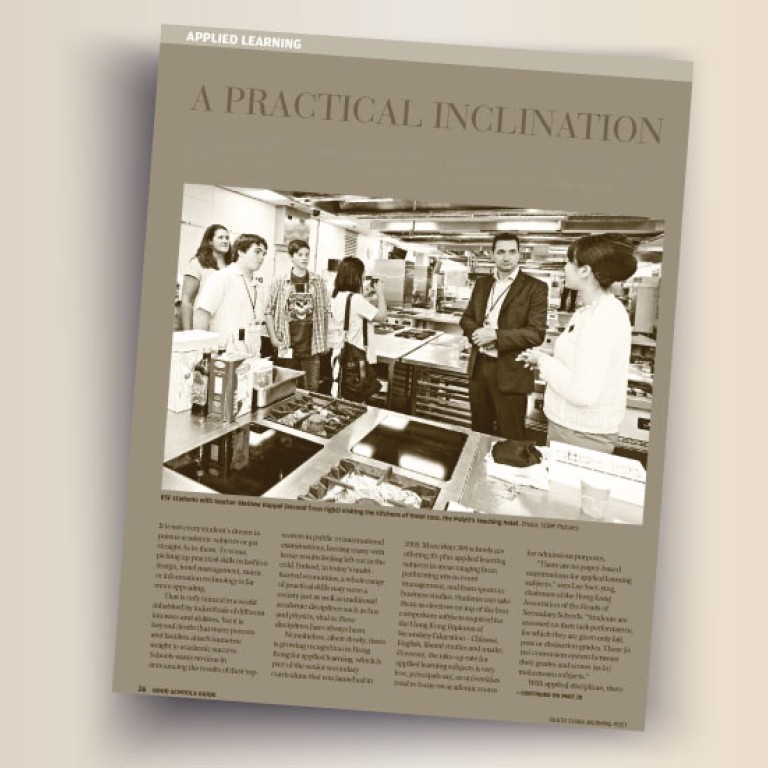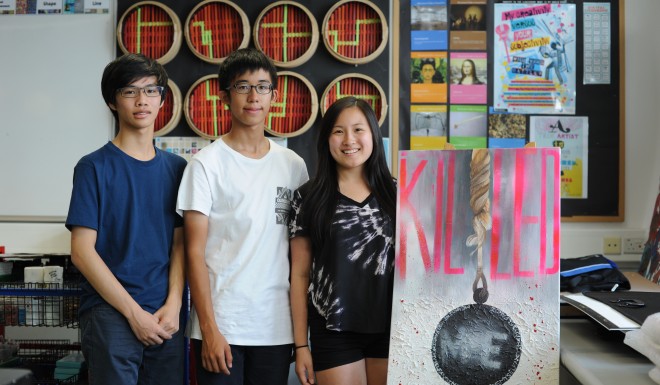
A Practical Inclination
A wide range of senior secondary programmes is now available for students who want to pursue a vocational degree leading directly to a career
[First published on 7 December, 2014] It is not every student’s dream to pursue academic subjects or get straight As in them. To some, picking up practical skills in fashion design, hotel management, music or information technology is far more appealing.
That is only natural in a world inhabited by individuals of different interests and abilities. Yet it is beyond doubt that many parents and families attach immense weight to academic success. Schools waste no time in announcing the results of their topscorers in public or international examinations, leaving many with lesser results feeling left out in the cold. Indeed, in today’s multifaceted economies, a whole range of practical skills may serve a society just as well as traditional academic disciplines such as law and physics, vital as these disciplines have always been.
Nonetheless, albeit slowly, there is growing recognition in Hong Kong for applied learning, which is part of the senior secondary curriculum that was launched in 2009. More than 300 schools are offering 30-plus applied learning subjects in areas ranging from performing arts to event management, and from sports to business studies. Students can take them as electives on top of the four compulsory subjects required for the Hong Kong Diploma of Secondary Education – Chinese, English, liberal studies and maths. However, the take-up rate for applied learning subjects is very low, principals say, as universities tend to focus on academic scores for admissions purposes.
“There are no paper-based examinations for applied learning subjects,” says Lee Suet-ying, chairman of the Hong Kong Association of the Heads of Secondary Schools. “Students are assessed on their task performance, for which they are given only fail, pass or distinction grades. There [is no] conversion system between their grades and scores [as in] mainstream subjects.”
With applied disciplines, there are far more opportunities for further study abroad than there are in Hong Kong. For the past eight years, the English Schools Foundation, the largest provider of international education programmes here, has given its upper secondary students the option of work-related courses leading to the BTEC qualifications awarded by Edexcel, Britain’s largest awarding body. The pre-university vocational qualifications are recognised internationally and also by a string of institutions in Hong Kong, including the Hong Kong Design Institute, SCAD Hong Kong (the local campus of US-based Savannah School of Art and Design), and Polytechnic University.
ESF students can combine BTEC with IB diploma and/or GCE A-level courses to increase their range of choices for higher education. Currently, more than 140 students in Year 12 and 120 students in Year 13 have gone down the applied learning route, studying various subjects.

ESF school development advisor (secondary) Chris Durbin says the foundation adopted a personalised approach to practical subjects, allowing students to combine a specialist interest with more generic applied learning.
In the context of Hong Kong culture, Durbin notes, youngsters with less academic aspirations sometimes have self-esteem issues. “They are more immune to the culture in international schools but it still lingers a bit,” he says. “It is not so much in the teachers as in the families, the students themselves.”
In late September, the foundation held its first Asia-Pacific Applied Learning Conference at the campuses of West Island School and South Island School, showcasing to teachers from across the region its achievement in creating alternative pathways for students. Held concurrently was an education fair on further study opportunities in applied subjects that 70 universities and colleges took part in. Twelve accomplished figures from different fields, including a chef, a marketing director, a civil engineer and a fashion designer, shared insights about their career paths with students at talks and workshops. There was also a professional development day for BTEC teachers from Hong Kong, China and other countries including Taiwan, Myanmar, Malaysia, and Thailand. In September, ESF private independent school Renaissance College (RCHK) in Discovery Bay launched Hong Kong’s first
International Baccalaureate Careerrelated Programme in partnership with SCAD Hong Kong. On the twoyear programme, students can take up to six SCAD courses, which make up about one-third of the total. Talks, lectures, career pathway discussions and other events held by SCAD Hong Kong at its campus are also open to students taking the programme.
Among the five ESF secondary schools, business studies is a core applied subject. “We are trying to prepare students for thinking about business and enterprise. The philosophy is business and ‘something’ - business and art; sport and business etc. What is the point of doing business, if you don’t have something to do it with and about?” says Durbin, adding that creativity, enterprise and ethics form the basis of the study framework.

Whatever their area of speciality, students on applied programmes are expected to do work-based learning and projects. Assessment is based far more on portfolios than on pen and paper examinations. As well as exposing them to the world of work, the aim is to help all students learn happily, and be energised by doing what they are passionate about.
“We know from studies on wellbeing amongst young people that different things can make them demotivated, even depressed,” says Durbin. “If students don’t have a good time in school, and they don’t do appropriate things that progress to where they are going to, their motivation goes down, their grades go down. What we are doing is saying to the 16-year-olds: ‘Here is a range of things you can do and here is the route to do it. Meanwhile, we will make sure you have a portfolio of experience and assessment that looks really good, to get you accepted by universities or colleges’.”
There is no shortage of interest in fast-growing practical fields. Alex Llewellyn, a Year 12 student at South Island School, and Michelle Leung, a Year 13 student at Island School, were among ESF students who joined a tour of Hotel Icon, PolyU School of Hotel and Tourism Management’s teaching hotel, which coincided with the conference. Both are interested in joining the hospitality field. “It is amazing to see students running a hotel here,” says Alex, who is also considering studying aviation. “I am planning to study in UK but may come back to work afterwards.” Michelle is drawn to studying hotel management in Switzerland. “Hong Kong is my second choice,” she says. “It seems interesting that you get to work in different departments in a hotel. My cousin did a hospitality course in Australia and she liked it. She showed me pictures of her working in a restaurant as an intern. That’s so cool.”

